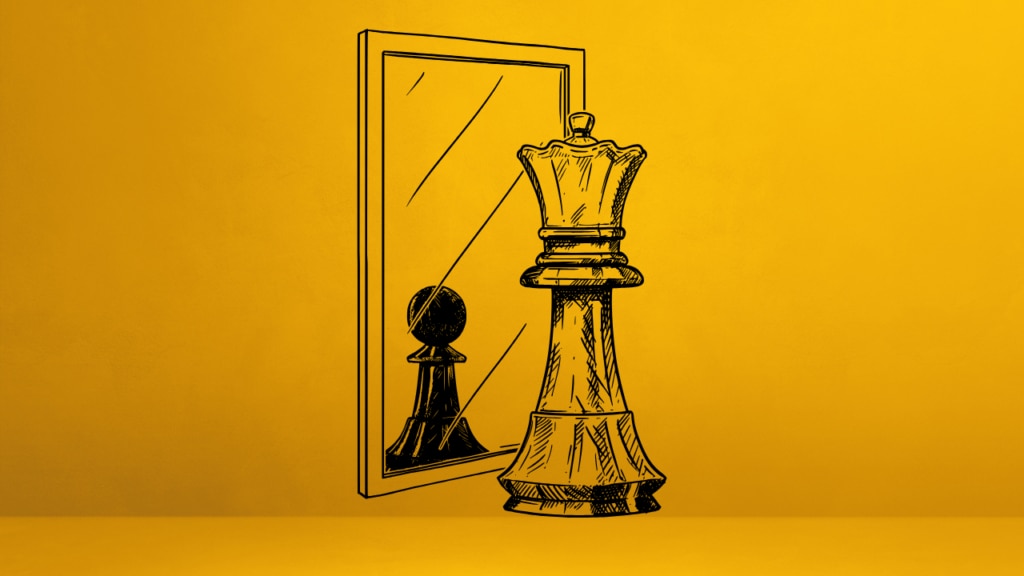Rizwan Khan, Missionary, USA

How complexes exist outside of religion
When someone has an inferiority complex, it’s because they’ve accepted someone else’s superiority over them. Superiority and inferiority complex are inseparably linked; they’re two sides of the same coin. People don’t develop an inferiority complex in a void. It’s inherently a reaction – a response to one’s environment.
This is also not an exclusively religious topic; it’s a secular topic and a sociological reality. They are emotional problems caused by unreasonable fears and worries. They manifest in many ways, and religion is just one of them.
These complexes have manifested in significant ways throughout history. For example, a part of the history of colonisation was cultural imperialism. Historically, people could more easily be subjugated and ruled if they could be made to accept an inferiority complex about their culture and identity.
One way of doing that was to take away their language. In the history of the United States and Canada, Native Americans were forbidden from speaking their languages to take away their identity. It was a tool for imposing a culture and identity onto them. They were made to feel that their culture and identity were inferior.
Even today, many people anglicise their names or change them to entirely Western names out of an inferiority complex. One study among Chinese students found that the “adoption of Anglo names was negatively associated with self-esteem.”
When people start to believe that their language and their culture are inferior, they feel embarrassed to be identified by their language. This is a result of low self-esteem and a feeling of inferiority.
Now, this is all unrelated to religion. They are just points of race or culture that are not as important as morals and religious principles. There is no absolute superiority in any race or culture. This is why Islam embraces all cultures that do not oppose its teachings.
However, when someone suffers from an inferiority complex about being an Ahmadi Muslim and lives a double life, it’s even more unfortunate than someone who suffers from a racial or cultural inferiority complex.
Disbelievers and superiority complexes
Why would an Ahmadi Muslim develop an inferiority complex? One reason for this is not having the strength to stand up against the influence of a largely non-Muslim society. If someone believes Ahmadiyyat is true but still lives a double life, it is because he has accepted that feeling of inferiority. He may feel overwhelmed by how outnumbered he is. He wants to fit in.
In the West, Islam and its beliefs and practices are often looked down upon and even mocked at times. Whether among liberals or conservatives, different Islamic ideals are sometimes seen as going against “Western” values, as backwards and incompatible with the modern world, or inferior.
The prevalent ideologies in most Western societies are described as the ideologies of the “dajjal” by the Holy Prophetsa. When we leave the mosque, we enter a society that looks down on the ideals Islam teaches, a society that believes its ideals are superior.
This is nothing new; it’s a story that has repeated itself throughout the history of the prophets of God. For example, the Holy Quran tells us how the people of Hazrat Noahas said to him, “And we see that none have followed thee but those who, to all outward appearance, are the lowliest of us. And we do not see in you any superiority over us.” (Surah Hud, Ch.11: V.28)
The communities of prophets of God have always been belittled and looked down on by the opponents who outnumbered them. The reason disbelievers did this was the same reason why countries practised cultural imperialism. They would look down on and belittle the believers hoping that they would develop a feeling of inferiority, because then they could more easily subjugate them.
In the past, some prominent Muslims who were weak developed complexes as well. There are many people in the past who unfortunately compromised on their principles out of a need to fit in. For example, the Promised Messiahas said about Sir Syed Ahmad Khan:
“By being influenced by another nation’s dominance and becoming a yes-man, the situation eventually reaches a point where in his final days, he declared even the believers in the Trinity to have achieved salvation. The ultimate result of compromising principles is that one has to become one with those people. This is why the Holy Quran says:
وَلَنۡ تَرۡضٰی عَنۡکَ الۡیَہُوۡدُ وَلَا النَّصٰرٰی حَتّٰی تَتَّبِعَ مِلَّتَہُمۡ
‘And the Jews will by no means be pleased with thee, nor the Christians, unless thou follow their creed.’ [Surah al-Baqarah, Ch.2: V.121]” (Malfuzat [Urdu], 2022, Vol. 6, p. 44)
Why there is no need for an inferiority complex

The second reason why an Ahmadi Muslim may develop an inferiority complex is not having enough knowledge of Islam Ahmadiyyat. Out of ignorance, they accept the superiority complex of those who mock Islam, despite the fact that Islam is superior in every comparison.
Unlike race, moral and ethical ideals can be proven to be superior to the ideals that oppose it. An Ahmadi Muslim is established on truth and reality which is objectively superior. If there were any room for complexes in Islam, then an Ahmadi Muslim would have a superiority complex if anything.
When we look at each point where the ideals of Western culture differ from Islam, where there is a conflict between an Ahmadi Muslim identity and a Western identity, the principles of Islam are proven objectively superior on each point; the Islamic lifestyle is superior.
For example, some people feel ashamed to tell people they don’t drink alcohol, even though it’s objectively better to not do so. Such people may have never told their classmates or co-workers that they’re Muslim.
Then, when someone offers them a drink at a get-together, they feel hesitant to say “no” because then they would have to explain that they’re Muslim and they don’t drink. They feel pulled towards living a double life.
This is despite the fact that Islam has taught us that the harms of alcohol outweigh any benefits, and experts today have recently accepted this reality. This is not a subjective point like race or culture.
There was a time only a decade ago when scientists were saying that drinking some wine was good for health, and these findings were presented as evidence against Islam’s teachings. However, the World Health Organization has now said that when it comes to alcohol consumption, there is no safe amount that does not affect health.
Thus, there should be no room for an inferiority complex when an Ahmadi Muslim has always been established on superior ideals.
Another example is that some people feel ashamed to tell their non-Ahmadi friends that they do not date and they practise the prescribed Islamic form of marriage. They’re embarrassed that their friends would think that the Islamic concept of marriage is backwards and out of touch with the modern world.
However, the reality is that the Islamic concept of marriage is demonstrably superior. In every society, dating is inseparably linked with the normalisation of premarital sex, which causes the plague-like spread of sexually transmitted infectious diseases. In the United States, the CDC recently said, “The U.S. STI epidemic shows no signs of slowing.”
One in five people in the US has an STI, and almost half of new STIs were among youth aged 15–24. This is the ground reality. This plague-like epidemic of sexually transmitted infectious diseases is unheard of where Islamic arranged marriages are practised.
The Holy Prophetsa said that the Dajjal would appear and there would be along with him water and fire and what the people would see as water that would be fire and that would burn and what would appear as fire that would be water. (Sahih Muslim, Kitab al-fitan wa ashraat al-sa’ah, Bab dhikr al-dajjal wa sifatihi wa ma ma’ahu, Hadith 2935a)
This is what we see happening today. This situation is even worse among those involved in homosexual sex. While anyone who exposes themselves to premarital sex can get an STI, the CDC says that sexually active gay and bisexual men are at greater risk.
Ideals that cannot stand the test of time

How can an Ahmadi have a complex about these issues? It would be one thing if Western ideals led to actual stable homes. It would at least be understandable why someone would think those ideals might be superior and why they could feel inferior.
But we live in a society where the divorce rate is so high that many children are in a house where they’re not being raised by both of their biological parents. That is how fundamentally broken many homes are.
This is a result of the skewed interpretation of the American dream of “freedom.” This is what permissiveness has done to society. Such statistics cannot contend with Islamic teachings. If there were any room for complexes in Islam, then an Ahmadi Muslim could have a superiority complex if anything.
We should zoom out for a moment and think of how history will look back at the absurdities of the unique times we are living through. These passing ideals in our present Western culture are not made to last.
It’s not just the family unit that’s deteriorating. The United States is heading towards a civil war, and the world is heading towards a world war. Now it’s not just warnings from the Khalifaaa, everyone is starting to see it.
This world will soon change, and history will look back on the ideals people believed in during these times. These ideals came as fashions and they’ll go out of fashion. They’ll go away as quickly as they came because they’re not sustainable.
Islam stands the test of time because it is based on unchanging realities, on truth, and on human nature. Prophets of God and their communities faced being outnumbered before as well, but they didn’t capitulate to pressure. When history looks back on us, it will look back on us in the same way history looks back on all communities of prophets of God, as those who stood by their principles against the passing ideals of their time.
Huzooraa said, “No Ahmadi Muslim ever needs to become victim to any form of inferiority complex – because we have reason, logic, evidence and above all the truth on our side.”
Huzooraa said:
“Instead, you should feel pride in your religious beliefs and be confident in the expression of your faith. Certainly, there is no Islamic injunction or restriction that is without reason or logic. Each Islamic teaching is based upon human nature and the means for ensuring societal peace and harmony. […]
“Be ever willing to go against the grain by giving precedence to your religious convictions.”
In the West, and particularly in the United States, it is a part of our culture to be proud of our beliefs. Even people who have clearly wrong beliefs and have no business being proud, take pride in their beliefs. It is considered a quality. So even by the standards of our culture, if someone is ashamed of their beliefs, it is a sign of weakness that our society would not respect.
Huzooraa said, “After accepting the Promised Messiahas, if we still have an inferiority complex or show weakness in giving precedence to our faith over this world, then it is a cause of great concern and a point of embarrassment. Always remember that the word of God will prevail and is without any flaw.”
How to stop living a double life
Now, if someone is living a double life, what practical steps can they take to overcome this? We have to develop pride in our Islamic identity when we’re away from the mosque.
What are some ways of doing this? For example, we can start by making sure to observe prayers on time even if we’re not at home or at the mosque.
Huzooraa said in the United States that families should offer prayers in congregation on their outdoor trips and should not feel any complex about it. They also become a source of tabligh [preaching] by offering a good example to those who are around them. When people see elders and youth who are dressed like them concentrating in salat, they are moved.
Explaining further, Huzooraa then said:
“Ahmadis should not fall prey to any kind of inferiority complex. It is our claim that we will create a spiritual revolution in the world. Only those can create that revolution who are free of every type of inferiority complex and who first create a spiritual revolution within themselves.” (Friday Sermon 22 June 2012; Khutbat-e-Masroor, Vol. 10, p. 385)
Another way of overcoming complexes is doing tabligh. This can also help an Ahmadi who is struggling to take pride in his identity. Huzooraa said that at a USA Ijtema some Khuddam were hesitant to go out and do flier distribution, but after they went out and experienced it, they gained confidence.
Huzooraa explained one reason for their initial hesitation, “When people hear wrong things attributed to Islam, there are some among the youth who don’t have knowledge about Islam so they develop an inferiority complex.” (Friday Sermon 15 October 2010; Khutbat-e-Masroor, Vol. 8, p. 533)
One can overcome this complex by increasing their knowledge. Huzooraa said elsewhere,
“[…] So it is essential that you read the Holy Quran and its commentaries and you study the Hadith and the books of the Promised Messiahas. By doing so, you will gain knowledge of your faith and it will remove any lingering traces of an inferiority complex […].”
Ultimately, the way to overcome an inferiority complex and to stop living a double life is by developing self-respect and taking pride in following the truth. Huzooraa said,
“Accordingly, no matter what allegations or criticisms are levelled against Islam, you must never feel any embarrassment or complexity over your faith. There is no allegation and no criticism that cannot be refuted.”
Similarly, he stated:
“[…] You should never hold any form of inferiority complex about your religion. Never entertain the thought that your religion is somehow backward or out of touch with the modern world.
“Conversely, the more you take pride in your religion and the more you live your lives according to the teachings of Islam, the more others will respect you and this is how your honour and dignity will be established in the world.
“Surely, there is no Islamic teaching that should cause any complexity or apprehension to emerge in your mind. Never worry for a second that others might taunt you or consider you to be a laughing stock because of your religious beliefs. If they mock, let them!
“Some people criticise or deride purdah and hijab while others disparage our way of offering Namaz. Unfortunately, some young Ahmadis, particularly teenagers, develop an inferiority complex or feel humiliated and rejected by such ridicule.
“However, if you are ever mocked for acting upon your religion, you should never take it as a personal humiliation; rather, you should consider it to be a badge of honour and feel pride in the knowledge that you have stayed strong in your faith in the face of adversity.
“Showing patience and keeping your head held high in such circumstances is the true means of establishing your honour and self-respect in the world. We are the fortunate ones, as we have not forgotten our values.”

